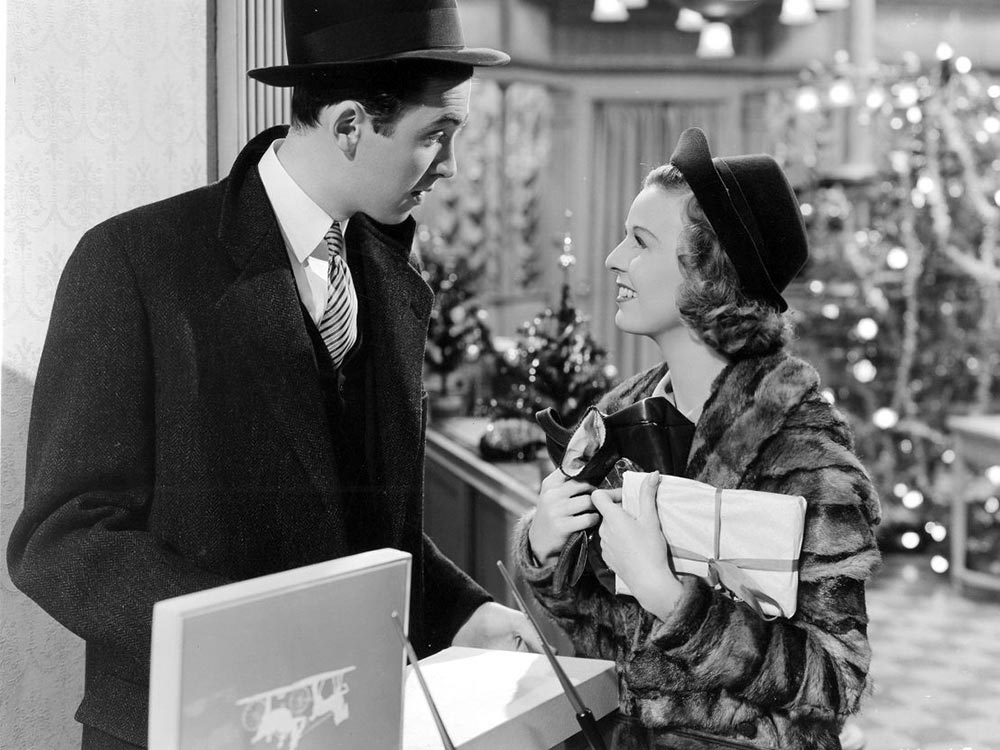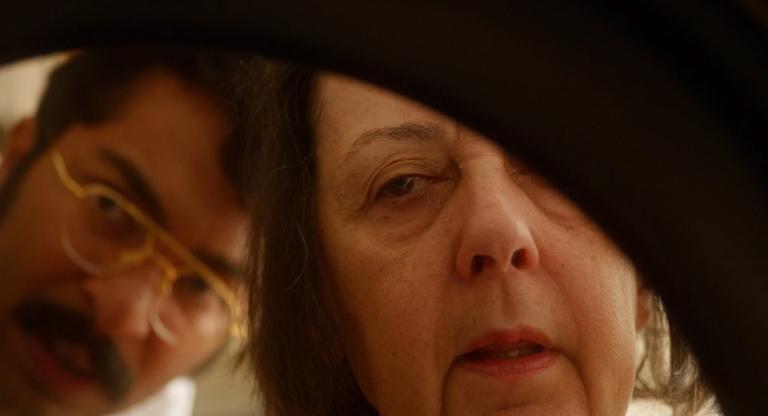Miklós László’s play Parfumerie has seldom left the zeitgeist since its 1937 premiere. The Hungarian dramatist’s story—of antagonistic shop workers who find love as anonymous pen pals—served as the basis for two musicals: the Judy Garland–starring In the Good Old Summertime (1949) and the oft-revived Broadway charmer She Loves Me. Drastically altering László’s narrative to pleasurable if problematic ends, Nora Ephron’s digital update You’ve Got Mail (1998) asks Meg Ryan’s children’s bookseller to chuck her principles for the big-box capitalist who conquers her business, heart, and inbox.
But it’s Ernst Lubitsch’s 1940 adaptation, The Shop Around the Corner, that remains the gold standard of these sundry incarnations. Debuting the same year that Hungary folded to fascist pressures and formally joined the Axis, Lubitsch’s classic is set in a snowy, apolitical Budapest. It unfolds in the quarters of the leather-goods store Matuschek and Company, whose eponymous owner (Frank Morgan, the Wizard of Oz himself) is despairing over his unfaithful, off-screen wife. He incorrectly believes that his senior employee, Alfred Kralik (James Stewart), is the lothario cuckolding him. But Kralik only has eyes for the unidentified “Dear Friend” whose letters he eagerly anticipates and pores over—never mind that the writer is Klara Novak (Margaret Sullavan), the shop’s new saleswoman and Kralik’s chief nemesis.
The Shop Around the Corner is a romantic comedy par excellence, one not hobbled but rather deepened by darker torrents of realism. The famed “Lubitsch Touch” manifests here as a pragmatic eye for the telling details of surface appearances: when the director deemed a $1.98 dress that Sullavan hand-picked for the film above her character’s means, the pair reached a compromise by leaving the garment in the sun so that its color would look faded on camera. Despite its visual grace and free-floating possibility of love and companionship, the cosmopolitan past of Lubitsch’s film is never as rosy as one may recall. I was surprised to rediscover that this is a film involving workplace abuse, soul-breaking infidelity, the threat of financial precarity, and a thwarted suicide.
Though intimately bonded, the employees of Matuschek and Company are prone to petty rivalries and sycophantic displays. “The feeling between the boss and those who work for him is pretty much the same the world over,” Lubitsch explained at the film’s Radio City Music Hall premiere. “Everyone is afraid of losing his job and everyone knows how little human worries can affect his job.” Lubitsch and his actors are adept at depicting an environment where morale lives or languishes based on the vagaries of the boss’s mood. A tragic air pervades the store when Kralik is unceremoniously dismissed from his position after pushing back against Matuschek’s hostility; in one of his most devastating performances, Stewart’s choked, whispered recitation of his letter of reference expresses the full emotional cost of insisting on one’s dignity at the expense of job security.
Likewise, there is real venom seeping from Stewart and Sullavan’s early repartee, which clacks and rings with a typewriter’s clang. A key scene at a restaurant, in which Kralik realizes that Klara is his beloved correspondent and proceeds to crash their first date, culminates in Sullavan calling Stewart a “little, insignificant clerk” with a disdain so potent that one might understandably expect bloodshed. That romance can emanate between these two after such a slight is one of the many wonders of Lubitsch’s film and a testament to the time-tested chemistry between his two leads, appearing here in their third of four lifetime collaborations.
Sullavan, who proved herself as one of classical Hollywood’s most idiosyncratic talents before her troubled life met its untimely end, is particularly wondrous in her most famous role. The actress possessed a beautifully unusual voice—husky, chiming, yet flecked with desperation; Louise Brooks, who idolized Sullavan, memorably compared its sound to someone “singing in the snow.” One senses traces of the actress’s tempestuous personality in her screen persona: even when she’s chuckling or cooing about her epistolary suitor, Sullavan’s sweetness is laced with salt. Her fizzy and teasingly ironic bearing evinces its own wavelength so that one of the film’s primary delights comes from watching a star as recognizable in his gestures and intonations as Stewart bend his own comedic rhythms and roughen his knightly manner to meet Sullavan in the sandbox of her design.
At their funniest, Sullavan’s ripostes and put-downs seem tethered to a heart that beats and breaks. In one of cinema’s most eloquent snapshots of romantic anguish, Lubitsch shows us Klara’s gloved hand patting the walls of her empty postbox, as filmed from the inside of the mailroom. Framed by other, fuller compartments, Klara ultimately gives up and we are suddenly left with a square of Sullavan’s breathtakingly bereft face, frozen in a deep frown. It is an image impossible to forget, a look that speaks to anyone whose lonely heart has skipped a beat at the thought of giving part of themself to another, if only in the folds of a letter.
The Shop Around the Corner screens Thursday, Friday, and Saturday at the Stanford on a double bill with The Wizard of Oz.
Previously:
The Shop Around the Corner screens tonight, December 11, and on December 23 and 24, at the Museum of the Moving Image as part of the series “MoMI Loves.”



